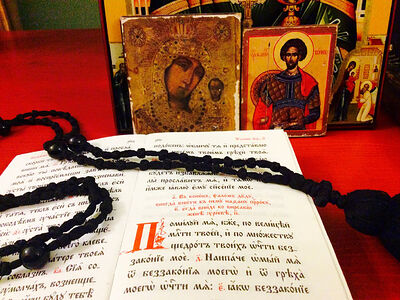Part 1/1: Let us Fast in Earnest
Part 1/2: The Meaning and Significance of Fasting
Part 1/3: Accustoming Ourselves to Fasting
Part 1/4: Spiritual Fasting
Part 2/1: On Prayer. What is Prayer?
Part 2/2: How to Prepare for Prayer?
Having fittingly prepared for prayer, a Christian arises for prayer with blessed hope: He lights a candle or lampada before the holy icons, guards himself with the Sign of the Cross, prostrates before God, and begins the usual prayer rule. In fulfilling his prayer rule, he should read without haste, penetrate into every word, bring the thought of every word into his heart, and accompany all of this with prostrations and the Sign of the Cross. This is the essence of a God-pleasing and fruitful prayer rule.
Absorb every word of prayer, bringing the meaning of every word into your heart; that is, understand what you read and feel what you have understood. For example, you read: “Cleanse me from every impurity”—feel all your impurity, be contrite about it, desire purity, and entreat it of the Lord with complete hope. You read: “Thy will be done”—and in your heart, completely commit your fate to the Lord, with full readiness to good-naturedly meet everything the Lord sends you. You read: “And forgive us our debts as we forgive our debtors”—and in your soul forgive everyone everything, thereby entreating forgiveness for yourself from the Lord God.
If you do this with every verse of your prayer, that will be a proper prayer rule. And in order to fulfill it more successfully this way, you need to: a) have a well-known prayer rule, not large, so that with your usual affairs, you can fulfill it unhurriedly; b) attentively read and ponder the prayers of your rule in your free time, understand and feel every word of prayer, to know in advance what should be in your heart and soul with every word, so it would be easy for you to understand and feel what you’re reading during your prayer rule.
If during prayer your thoughts fly off to other topics, strain to keep your attention and return your thought to the subject of prayer; and again it flies off—again bring it back. Repeat the reading until every word of the prayer is read with understanding and feeling. This will help you wean your mind from distractedness in prayer. But St. Basil the Great asks: “How can we achieve non-distraction in prayer?” And he answers: “Being undoubtedly convinced that God is before your eyes. One who prays with this conviction will have a mind that does not stray from the One Who tests the heart and reins... For this, one must not allow the soul to be idle from contemplation of God and His works and gifts, as well as from confession and gratitude for everything.”
And if some word of prayer has a strong effect on your soul, you need to pause on it, not proceeding further. Remain on this spot with attention and feeling, nourish your soul with it, or with the thoughts that it produces. Don’t disrupt this state until it passes on its own. That means the spirit of prayer begins to take root in the heart of the one who prays this way; and this state is the most reliable means of nurturing and strengthening the spirit of prayer in us.
Amen.







